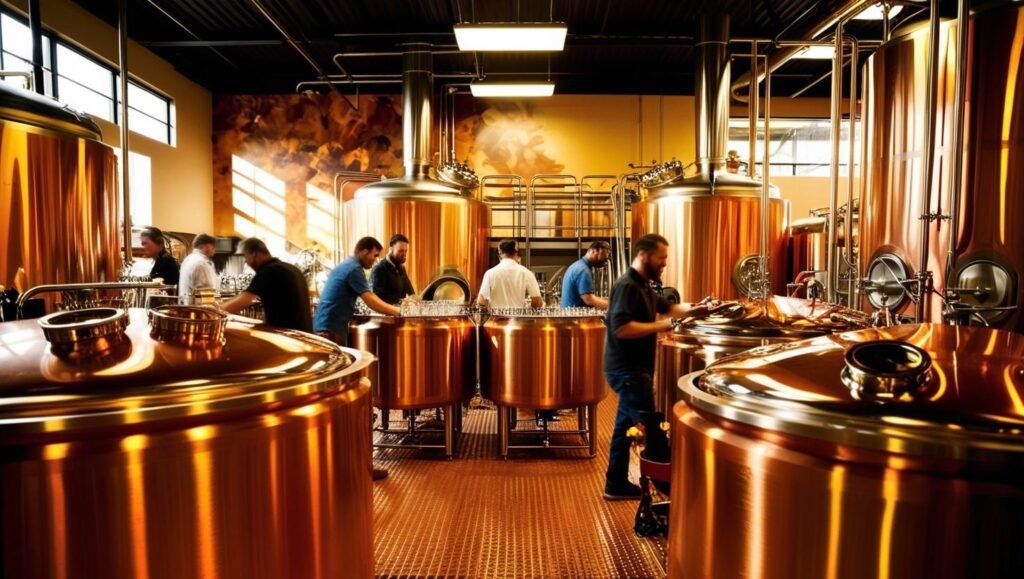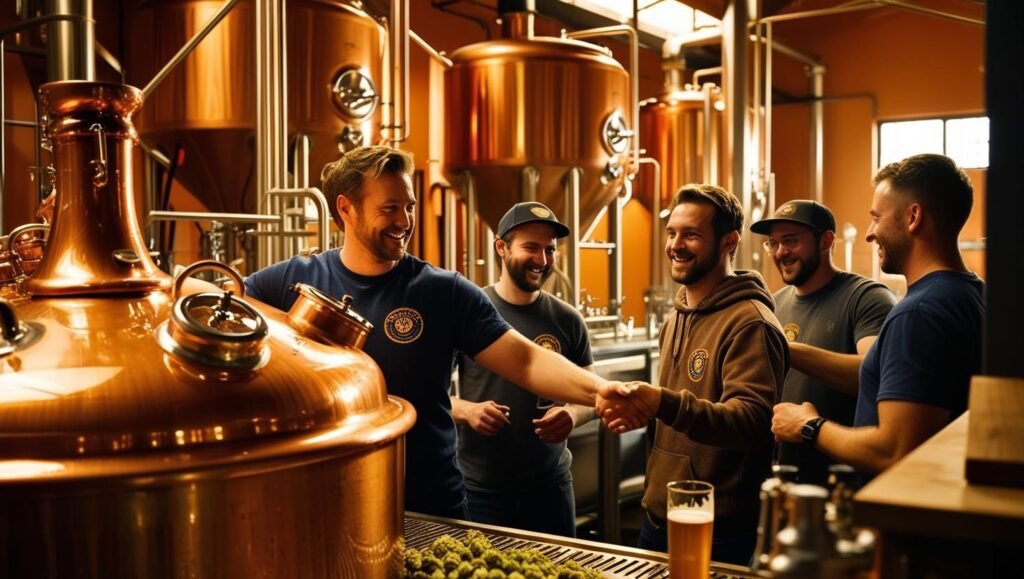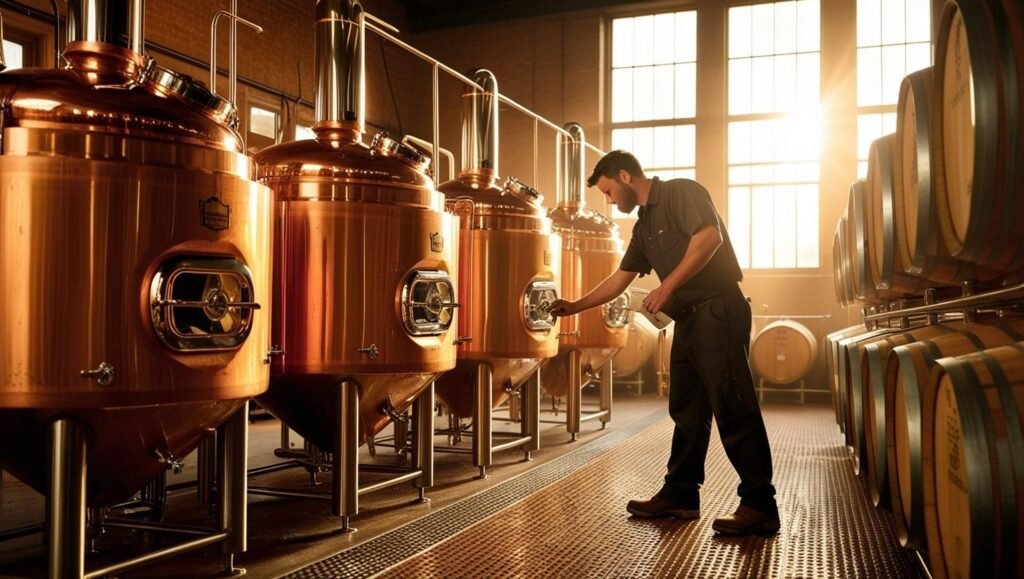This post may contain affiliate links. If you click and purchase, I may receive a small commission at no extra cost to you. Learn more
Discover the top craft breweries affiliate programs 2025. Earn commissions by promoting rising beer brands with high-paying affiliate options. Craft breweries are not only brewing great beer, they’re launching some of the best craft breweries affiliate programs for marketers and beer enthusiasts alike. These programs create exciting opportunities for content creators to earn by promoting their favorite brews.
The top craft breweries with affiliate programs stand out not just for their exceptional beers, but for their smart business approaches and community engagement. Many have launched affiliate programs that reward content creators, bloggers, and social media influencers for sharing their passion for craft beer.
Local brewers now use digital platforms to connect with customers beyond their taprooms. They offer exclusive deals, virtual tastings, and behind-the-scenes content through their affiliate partners, making craft beer more accessible to everyone.
Key Takeaways
- Small breweries are transforming into digital-savvy businesses with affiliate marketing programs
- Craft brewers focus on combining traditional brewing with modern business strategies
- Digital partnerships help expand reach and create new revenue streams for breweries
Evolution of Craft Breweries in 2025

Craft breweries have transformed significantly in 2025, embracing cutting-edge technology and eco-friendly practices to create exceptional beers while reducing their environmental impact.
Innovative Brewing Techniques
Smart fermentation systems now allow brewers to monitor and adjust brewing conditions in real-time through mobile apps. These systems track temperature, pressure, and yeast activity with precision.
AI-powered recipe development software helps brewers create unique flavor profiles by analyzing thousands of ingredient combinations. Several breweries have reported 30% faster recipe development times using this technology.
Ultrasonic aging technology has revolutionized the traditional aging process. This technique reduces aging time from months to weeks while maintaining flavor complexity.
Sustainability Practices
Solar panels and energy-efficient brewing equipment have become standard features in modern craft breweries. Many facilities now operate on 75% renewable energy.
Water recycling systems capture and purify wastewater for reuse in cleaning operations. These systems typically save 40-60% of water compared to traditional brewing methods.
Local grain sourcing programs connect breweries directly with farmers within 100-mile radius. This practice cuts transportation emissions and supports regional agriculture.
Biodegradable packaging materials, including six-pack rings made from spent grain, have replaced plastic packaging in most craft breweries.
Fastest-Growing Craft Breweries in 2025

Several craft breweries have shown remarkable sales growth and market expansion in the past year. These breweries combine innovative brewing techniques with strong distribution networks and effective marketing strategies.
Ready to monetize your beer blog?
Explore our top affiliate programs and start earning while sharing your favorite brews.
Regional Market Leaders
Sierra Nevada Brewing Co. expanded its market share by 15% in 2024, establishing new distribution centers in four states. Their sustainable practices and consistent quality helped secure deals with major retailers.
New Belgium Brewing increased production capacity by 25% at their Colorado facility. They launched three new year-round beers that captured significant market attention.
Bell’s Brewery saw a 12% revenue increase through strategic partnerships with local bars and restaurants. Their Two Hearted Ale remains the top-selling craft IPA nationwide.
Emerging Startups in the Brewery Scene
Athletic Brewing Company leads the non-alcoholic craft beer segment with 85% year-over-year growth. Their online direct-to-consumer sales doubled in 2024.
Ghost Town Brewing emerged as a rising star in California, expanding from one taproom to four locations in 18 months. Their unique barrel-aging program attracts beer enthusiasts across the West Coast.
Weathered Souls Brewing Co. gained national recognition through innovative collaborations and social initiatives. Their distribution network now reaches 12 states, up from just three in 2023. Despite this great success, the brewery has been shut down in September of 2024.
Best Brewery Affiliate Programs in 2025

Craft breweries are creating new revenue streams through affiliate marketing partnerships. These programs let influencers and content creators earn commissions by promoting beer-related products and merchandise.
Understanding Affiliate Marketing in the Craft Beer Industry
Affiliate marketers promote brewery merchandise, gift cards, and beer club memberships through unique tracking links. When customers make purchases using these links, the affiliate earns a commission – typically 5-15% of the sale.
Many craft breweries use affiliate networks like Awin, ShareASale and Impact to manage their programs. These platforms handle tracking, payments, and provide marketing materials to affiliates.
Popular brewery affiliate products include:
- Branded apparel and glassware
- Monthly beer subscription boxes
- Brewery tour packages
- Gift cards and merchandise
Benefits of Joining Craft Brewery Affiliate Programs
- No upfront cost to join
- Earn passive income through commission
- Promote what you genuinely enjoy
- Access exclusive discounts and early product releases
- Monthly payments via PayPal or direct deposit
Affiliates can earn passive income by promoting products they genuinely enjoy. Commission rates for craft beer affiliates average 8-12% per sale.
Breweries benefit from increased brand awareness and sales through trusted recommendations. The best programs provide affiliates with high-quality photos, product descriptions, and promotional materials.
Craft Brewery Affiliate Program Comparison (2025)
| Brewery Name | Commission Rate | Cookie Duration | Top Perks | Shop |
|---|---|---|---|---|
| Sierra Nevada Brewing Co. | Up to 20% | Not specified | High volume bonuses, VIP events | TRY NOW |
| New Belgium Brewing | Up to 20% | Not specified | Exclusive product access, early releases | TRY NOW |
| Bell’s Brewery | Not specified | Not specified | Real-time inventory, community donations | TRY NOW |
| Stone Brewing | 5–12% | Not specified | VIP tours, tiered bonuses | TRY NOW |
| Dogfish Head Brewery | Not specified | Not specified | Dedicated affiliate managers, brewing experience | TRY NOW |
| Russian River Brewing Co. | Not specified | Not specified | First access to Pliny the Younger release | |
| Athletic Brewing Company | 2.25% per sale via referral link | Not specified | Access to new releases, ambassador rewards, discounts | TRY NOW |
| Ghost Town Brewing | Not specified | Not specified | Barrel-aging program, rapid expansion | |
| Weathered Souls Brewing | N/A (Closed) | N/A | Was known for social initiatives |
How We Chose the Best Breweries for Affiliates

The breweries featured in this guide meet strict quality standards and demonstrate strong market presence through their branding, distribution, and customer engagement.
Quality and Diversity of Beer Selection
Each brewery must maintain consistent flavor profiles and brewing standards across their entire product line. Quality control testing and expert reviews play a key role in evaluating beer selection.
Master brewers need certified training and at least 5 years of professional brewing experience. This ensures proper technique and recipe development.
The beer lineup should include at least 6-8 year-round offerings across different styles like IPAs, stouts, and lagers. Seasonal and limited releases add variety.
Key Quality Markers:
- Clean fermentation with no off-flavors
- Fresh ingredients from reputable suppliers
- Regular lab testing of each batch
- Proper storage and handling procedures
Brand Presence and Marketing Strategies
Social media engagement rates need to exceed 5% across platforms. Active accounts on Instagram, Facebook and Twitter are essential for customer connection.
Breweries must offer affiliate partnerships with clear commission structures and marketing materials. Program details should be easy to find on their website.
Distribution reach matters – breweries need availability in multiple states or regions. Local market penetration should be at least 60% of potential retail accounts.
Required Marketing Elements:
- Professional website with online store
- Regular brewery events and tours
- Consistent brand identity across packaging
- Active email newsletter program
Bonus Affiliate Programs to Maximize Your Craft Beer Earnings
While craft breweries’ affiliate programs are fantastic for niche traffic, diversifying your affiliate links with craft beer-related services can significantly boost your monetization potential. Here are three powerful platforms you should consider:
Beer of the Month Clubs
Beer subscription services like The Microbrewed Beer of the Month Club offer curated selections of microbrews delivered monthly. They’re perfect for readers looking to explore new craft beers from home.
- Affiliate Networks: ShareASale, Impact, CJ Affiliate
- Commission Rates: Up to 20% per sale
- Why Promote It: High gift appeal, strong seasonal demand (e.g., Father’s Day, holidays)
- Perfect Anchor Text: “Discover the best beer subscription boxes for craft beer lovers.”
The Bro Basket
The Bro Basket is a premium gift basket service featuring craft beer, gourmet snacks, and themed boxes. It’s ideal for special occasions like birthdays, bachelor parties, or client gifts.
- Affiliate Network: ShareASale
- Commission Rates: 10–15%
- What Sets It Apart: Unique bundles tailored to beer drinkers
- Suggested Anchor Text: “Shop the ultimate gift for craft beer lovers.”
Craft Breweries and Tech Innovation
Digital tools and platforms have transformed how craft breweries connect with customers and streamline their operations in 2025. New technologies help these businesses boost sales, improve efficiency, and create better customer experiences.
Role of Mobile Apps
Craft breweries use custom mobile apps to notify customers about new beer releases and special events. These apps often include digital loyalty programs that reward frequent visitors with exclusive perks and early access to limited releases.
Many breweries now offer mobile ordering through their apps. Customers can pre-order beers for pickup or reserve spots at tasting events with just a few taps.
Real-time inventory tracking helps breweries manage their tap lists. When kegs run dry or new beers become available, the app automatically updates to show current offerings.
E-Commerce Integration
Online stores let craft breweries sell merchandise, gift cards, and beer directly to customers. Many breweries offer subscription boxes with quarterly releases of exclusive brews.
Key e-commerce features include:
- Automated shipping notifications
- Age verification systems
- Local delivery scheduling
- Digital gift cards
- Membership program management
Payment processing systems integrate with point-of-sale systems to track both in-person and online sales. This gives breweries better insight into customer preferences and buying patterns.
Cloud-based inventory systems help breweries manage stock across multiple sales channels. These tools prevent overselling and ensure accurate online availability.
Marketing Strategies for Breweries with Affiliates
Successful brewery affiliate programs combine targeted social media tactics with strategic partnership opportunities to maximize reach and sales. Affiliate marketers play a key role in spreading brand awareness and driving customer acquisition.
Effective Social Media Campaigns
Instagram and TikTok drive the highest engagement for craft beer content. Breweries should provide affiliates with high-quality product photos and video clips to share.
Top-performing content types:
- Behind-the-scenes brewery tours
- Beer pouring and tasting videos
- Limited release announcements
- Food pairing suggestions
Affiliates need clear posting guidelines and branded hashtags. A content calendar helps coordinate promotional efforts across multiple partners.
Track engagement metrics like clicks, shares, and conversions. Use platform-specific tracking links to measure affiliate performance accurately.
Collaborations and Cross-Promotions
Joint marketing efforts between breweries and complementary businesses create win-win opportunities. Local restaurants, food trucks, and entertainment venues make natural affiliate partners.
Effective collaboration ideas:
- Beer dinner pairings at restaurants
- Brewery tour packages with local hotels
- Festival presence with food vendors
- Taproom events with musicians
Provide affiliates with exclusive discount codes and promotional materials. Set clear commission structures based on sales volume or referral traffic.
Monitor affiliate sales data monthly to identify top performers. Reward successful partners with increased commission rates or exclusive product access.
Craft Breweries Affiliate Program Guide: Commissions, Tools, and Success Tips
Craft brewery affiliate programs reward partners with competitive commissions while providing essential marketing tools and resources to drive sales success.
Commission Structures
Most craft breweries offer commission rates between 5-15% on referred sales. Top performers like Sierra Nevada and New Belgium pay up to 20% for high-volume affiliates.
The payment threshold typically starts at $50, with monthly or quarterly payouts via PayPal or direct deposit.
Many programs use a tiered commission structure:
- Bronze (0-5 sales/month): 5% commission
- Silver (6-15 sales/month): 10% commission
- Gold (16+ sales/month): 15% commission
Cookie duration ranges from 30-90 days, giving affiliates time to convert potential customers.
Support and Resources for Affiliates
Affiliates receive custom tracking links and promotional codes to monitor referral performance through dedicated dashboards.
Marketing materials include:
- High-resolution product photos
- Pre-written social media posts
- Seasonal campaign banners
- Product description templates
Monthly newsletters keep affiliates updated on new releases and promotional opportunities. Many breweries provide one-on-one support through dedicated affiliate managers.
Free product samples help affiliates create authentic content and reviews. Training webinars teach effective promotion strategies specific to craft beer products.
Unique Events Hosted by Top Breweries
Craft breweries create memorable experiences through exclusive tastings and behind-the-scenes tours that connect beer enthusiasts directly with master brewers and their craft.
Exclusive Tasting Events
Deschutes Brewery offers VIP barrel-aged beer releases limited to 100 guests per event. Members get first access to rare bottles and meet directly with brewers.
Sierra Nevada hosts quarterly farm-to-table beer dinners, pairing seasonal brews with locally-sourced dishes. Their chef collaborates with brewers to create unique flavor combinations.
Stone Brewing runs Rare Beer Clubs where members sample experimental batches before public release. Monthly meetups feature Q&A sessions with the brewing team.
Brewery Tours and Experiences
New Belgium‘s “Beer Scout” program takes visitors through their Fort Collins facility in small groups of 8-10 people. Tours include sensory training and ingredient sampling stations.
Sam Adams offers hands-on brewing workshops where guests create custom recipes. Participants return after 4 weeks to bottle their beer and receive brewing certificates.
Founders Brewing provides virtual reality tours showing the complete brewing process. Visitors use VR headsets to explore fermentation tanks and packaging lines while sampling matching beers.
The Brew Master Experience at Dogfish Head lets guests shadow brewers for a full day. Participants help measure ingredients and learn quality control procedures.
Championing Local Communities Through Brewing
Craft breweries strengthen neighborhoods by sourcing local ingredients and giving back through targeted community programs. These actions create jobs, support farmers, and build lasting connections between brewers and residents.
Community Support Programs
Many craft breweries donate a portion of their profits to local charities and schools. Sierra Nevada Brewing Co. gives $1 million yearly to environmental and educational causes in California and North Carolina.
Bell’s Brewery runs monthly fundraising nights where 10% of taproom sales go to area non-profits. They raised over $200,000 in 2024.
New Belgium Brewing offers grants up to $10,000 to community organizations focused on sustainability and bicycle infrastructure. They’ve funded over 50 projects since 2020.
Local Ingredient Sourcing
Craft brewers partner with nearby farms to get fresh ingredients. Russian River Brewing sources 90% of their hops from farms within 100 miles of their brewery.
Allagash Brewing Company contracts with Maine farmers to grow their barley and wheat. This partnership supports 12 family farms and ensures grain quality.
Average ingredients sourced locally by top craft breweries:
- Hops: 45%
- Grains: 35%
- Fruit/Specialty: 60%
These direct farm relationships boost local economies and create unique regional beer styles.
Case Studies of Successful Partnerships
Sierra Nevada Brewing Company partners with over 500 specialty beer shops across the US. Their affiliate program pays 8% commission on all sales, leading to a 45% increase in online revenue during 2024.
New Belgium Brewing‘s partnership network grew by 300% in the past year. They offer affiliates exclusive early access to limited releases and seasonal varieties, plus promotional materials and photography.
Stone Brewing rewards top-performing affiliates with brewery tours and VIP events. Their tiered commission structure ranges from 5-12% based on sales volume, with bonuses for hitting quarterly targets.
Top Affiliate Success Metrics:
- Average order value: $75-125
- Conversion rate: 3.5-6%
- Commission earnings: $2,500-7,500/month
Dogfish Head Brewery‘s affiliate program stands out for its personalized approach. They assign dedicated account managers to partners generating over $10,000 in quarterly sales.
Russian River Brewing Company built strong relationships with beer review sites and influencers. Their affiliate partners get first access to the coveted Pliny the Younger release each February.
Bell’s Brewery provides affiliates with real-time inventory updates and customizable tracking links. This system helped them maintain a 98% fulfillment rate for online orders.
Building a Career in the Craft Brewing Industry
The craft brewing industry offers diverse career paths and opportunities for growth through hands-on experience and formal education. Many successful brewers combine practical skills with technical knowledge to advance in this dynamic field.
Jobs and Roles in Breweries
Entry-Level Positions:
- Production Assistant
- Packaging Operator
- Taproom Server
- Quality Control Technician
Advanced Roles:
- Head Brewer
- Brewing Operations Manager
- Quality Assurance Manager
- Recipe Developer
Starting in packaging or the taproom lets workers learn brewery operations from the ground up. Many brewers begin as production assistants, learning equipment maintenance and brewing processes.
A quality control position focuses on testing beer samples and maintaining consistency. This role requires attention to detail and basic chemistry knowledge.
Educational Paths and Certifications
The Cicerone Certification Program proves beer knowledge and tasting skills through four levels. Many breweries prefer candidates with at least Level 1 certification.
Key Educational Options:
- Brewing Science Degree Programs
- Technical College Certificates
- Master Brewer Certification
- Business Management Courses
Local technical colleges offer brewing certificates that teach fermentation science and brewery operations. These programs typically take 6-12 months to complete.
Online courses from the Brewers Association provide flexible learning options. These courses cover topics from raw materials to packaging methods.
Hands-on apprenticeships at local breweries complement formal education. Many successful brewers combine both approaches.
Looking Toward the Future of Craft Brewing
The craft brewing industry stands at an exciting crossroads in 2025, with new technology and changing consumer preferences shaping its evolution. Independent breweries continue to push boundaries with innovative ingredients and sustainable practices.
Predictions and Trends
Automation and AI-powered brewing systems will become more common in craft breweries by 2026. These tools help maintain consistency while allowing brewers to experiment with new recipes.
Non-alcoholic craft beers are gaining significant market share, with sales expected to grow 25% annually through 2027. Many breweries now dedicate specific production lines to these offerings.
Key emerging trends:
- Low-calorie craft options
- Sustainable packaging solutions
- Hybrid beer styles combining multiple traditions
- Enhanced taproom experiences with digital integration
Potential for International Expansion
Asian markets show strong interest in American craft beer, with Japan and South Korea leading import growth at 15% year-over-year.
European partnerships create new opportunities for craft brewers. Several US breweries have opened collaborative brewing spaces in Germany and Belgium.
Distribution technology improvements make international shipping more viable for small brewers. Temperature-controlled containers and real-time monitoring protect beer quality during transport.
Target growth markets:
- Southeast Asia
- Northern Europe
- Urban centers in South America
Digital marketing and e-commerce platforms help craft brewers reach global audiences without massive marketing budgets.



